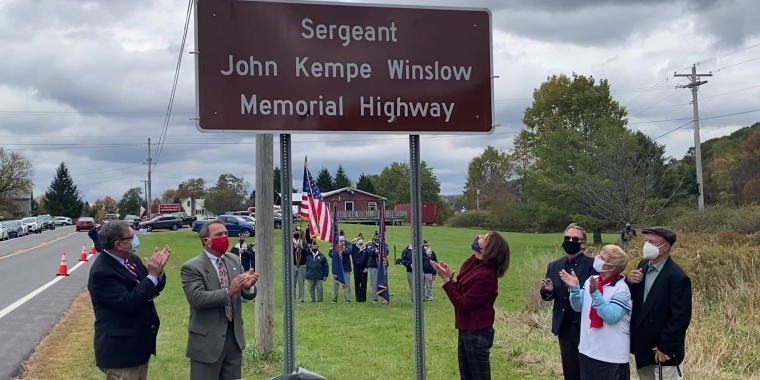
Seward: New Year Needs Three Step Focus; Real Solutions
In press conferences across his district kicking off the 2008 session of the New York State Senate, Senator James L. Seward outlined a plan he dubbed "Focus 1-2-3," saying the state legislature and governor must focus on 1) Genuine and structural property tax relief, 2) A comprehensive plan for economic growth, and 3) New measures to help cut energy costs for consumers.
"As we start a new session, nothing is more apparent than the fact that our property taxes are too high, we need new jobs, and energy costs are hurting families," Seward said. "We must provide real solutions to these issues and that's what 'Focus 1-2-3' is all about."
Focus 1 -- Property tax relief. Seward called for doubling the property tax rebate program for most taxpayers and tripling it for seniors as interim measures toward more fundamental and structural property tax relief that would produce recurring, long term savings.
"The rebates help with out-of-pocket taxes for property taxpayers, and we need a longer term solution that is structural and provides lower tax bills in the first place," Seward said. Seward outlined his keys to holding the line on property taxes:
*Review and overhaul of state mandates and legislative veto of agency rules;
*State assumption of local residential property taxes at local option;
*Prohibiting state agencies from enacting new rules that cost local governments;
*State funding of mandates on local governments;
*Limiting state spending;
*Enhanced Medicaid fraud detection, which saves both state and counties;
*Improving the state's shared municipal services program, to encourage shared services among and consolidation of local governments where it's feasible and local support exists;
*Tying state funding for local governments to property tax relief.
"The Medicaid cap the state enacted will save the counties in my district $34 million in 2008, and the state must ensure that we continue to lift Medicaid's burden on county taxpayers," Seward said.
Focus 2 -- Jobs and economic growth. Seward today said that New York must make the upstate economy a priority, with targets for annual job creation. Seward, a member of the Senate Committee on Commerce, Economic Development and Small Business, proposed an economic growth plan with elements of:
*Health insurance availability and affordability for small businesses by loosening state mandates on health insurance;
*No new taxes or regulations on businesses; and a 90 day "fast track" effort by the state to identify and repeal regulations that curb or discourage job growth;
*Expanding broadband access;
*Supporting emerging technology;
*Enhanced retraining of workers for the jobs of tomorrow;
*Improved state promotion of tourism;
*Tort reform.
"Small businesses create the most jobs each year," Seward said, "and we need to make the promotion of and support for small business a state policy."
Focus 3 -- Renewable and alternative energy. "The prices of gasoline and home heating oil are hurting our families, schools and businesses. We must look to renewable and alternative energy to meet our future energy needs," Seward said.
Seward plans to continue his efforts to promote renewable and alternative energy in the 2008 legislative session through:
*Expanding 'net metering' (small renewable energy systems, connected to the state energy grid, to reduce consumers' electric bills) -- Increase the amount of power which could be redeemed for homeowners from 10 to 25 kilowatts and allow businesses and institutions to participate. This helps reduce utility bills for both businesses and residential customers and our dependence on foreign oil;
*Tax credits for businesses that install alternate energy systems;
*Tax credit for cellulosic ethanol -- In 2006, a biofuel production credit was put in place with Seward's support. Seward says a similar tax credit should be extended to specifically promote the production of cellulosic ethanol in New York State. Cellulosic ethanol is produced from trees and grasses which are well-suited to the climate of New York State;
*Improving biofuel and alternative fuels distribution infrastructure -- The lack of alternativefuel infrastructure has made biofuels and other alternatives largely unavailable for New York consumers. Seward advocates a 25 percent tax credit for the cost of installation of equipment necessary to store, mix and distribute biofuels;*Tax credit for solar and fuel cell manufacturers to encourage cutting edge alternative energy technology producers to locate and expand in New York State;
*Sales tax exemption for hybrid vehicles.
Seward has a strong record of supporting renewable and alternative energy initiatives. As chairman of the Senate Energy and Telecommunications Committee between 1986 and 1999, he championed "net metering," which allows consumers to install small utility grid connected renewable energy systems to reduce their electric bills. The 1997 law applied to solar generating systems, but the program has been expanded since then to include farm waste generating systems and residential and farm wind generating systems. Seward was also involved in the early promotion of alternate fuel vehicles while chairman of the committee, through tax credits for the purchase of alternative fuel vehicles.



